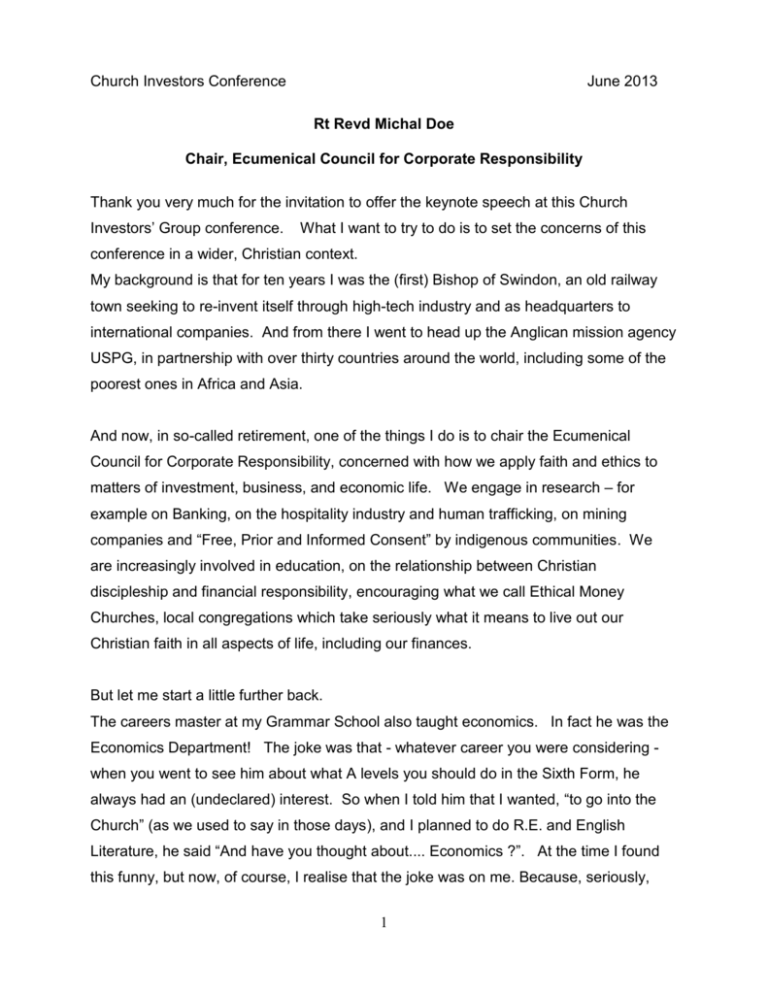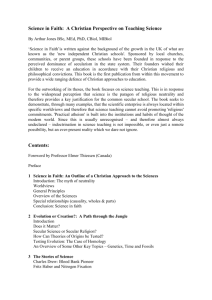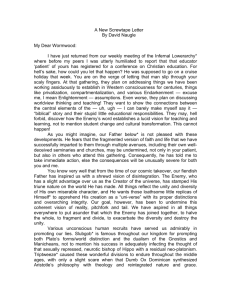Bishop Michael Doe Address CIG Conference, June 2013
advertisement

Church Investors Conference June 2013 Rt Revd Michal Doe Chair, Ecumenical Council for Corporate Responsibility Thank you very much for the invitation to offer the keynote speech at this Church Investors’ Group conference. What I want to try to do is to set the concerns of this conference in a wider, Christian context. My background is that for ten years I was the (first) Bishop of Swindon, an old railway town seeking to re-invent itself through high-tech industry and as headquarters to international companies. And from there I went to head up the Anglican mission agency USPG, in partnership with over thirty countries around the world, including some of the poorest ones in Africa and Asia. And now, in so-called retirement, one of the things I do is to chair the Ecumenical Council for Corporate Responsibility, concerned with how we apply faith and ethics to matters of investment, business, and economic life. We engage in research – for example on Banking, on the hospitality industry and human trafficking, on mining companies and “Free, Prior and Informed Consent” by indigenous communities. We are increasingly involved in education, on the relationship between Christian discipleship and financial responsibility, encouraging what we call Ethical Money Churches, local congregations which take seriously what it means to live out our Christian faith in all aspects of life, including our finances. But let me start a little further back. The careers master at my Grammar School also taught economics. In fact he was the Economics Department! The joke was that - whatever career you were considering when you went to see him about what A levels you should do in the Sixth Form, he always had an (undeclared) interest. So when I told him that I wanted, “to go into the Church” (as we used to say in those days), and I planned to do R.E. and English Literature, he said “And have you thought about.... Economics ?”. At the time I found this funny, but now, of course, I realise that the joke was on me. Because, seriously, 1 can you be a good Christian without some understanding of economics? That’s my first question this morning, and I have three questions in all. Can you be a good Christian, or at least can you be a competent Church Leader, if you do not understand economics? If being a Christian is about more than worship and prayer (important though they are), if Christian discipleship is about more than personal witness and charitable activity (though, again, these are important), is it possible to be a Christian, and a Christian leader, in our kind of world, without understanding how economic systems work, what they deliver, and the impact that has on the whole of society? Because only then can we look at how wealth is both created and distributed and ask, where is the Kingdom of God to be glimpsed, and where do we see it being denied? Where are the opportunities to build the kind of world which God wants, and what is standing in the way? Where in the financial world you inhabit is the saving activity of God in Christ, and, in the more graphic language of St Paul, where are the “principalities and powers” which would deny it? That’s why your work and why organisations like ECCR are important. It’s partly about how we as Church engage with these systems through the investment of our own money, corporately and individually. But it goes much wider and deeper than that. We are talking what is at the core of our faith about what God is doing (the “missio dei”) and how he calls us to respond. Hence my first question: is it possible to be a good Christian, or at least a good Church Leader, without understanding economics? My second question turns that on its head. Can you be a good economist without some kind of religious faith or at least some commitment to a defined morality? Now, many would say that that is a ridiculous question. Economics is a science, an empirically driven activity. Those who engage in it may bring their own personal faith and morality, determining how they as individuals work within it. That may raise issues of trust, good practice, and even reward. But the activity itself is a value-free. 2 I wonder. In many ways that was the belief of the neo-liberals in the days of Thatcher and Reagan, although when they claimed to be the inheritors of Adam Smith they were ignoring what he actually believed about social equality. The larger irony was of course that far from secularising economics the monetarists actually re-enchanted it, and the market itself became deified. And for many, what happened in the economic collapse of 2008 was that much of what this system was supposed to have created turned out to have no substance at all. The idol, as Isaiah would tell us, is only man-made wood. My question is therefore about how in economics, as a social and political activity as much as a financial one, issues of faith and morality emerge and our met. For they are certainly there: in the creation of wealth, and whether or not it is real; in the use of wealth, so that it might produce what is needed most in terms of food, homes, and so on; and therefore in the distribution of wealth, whether we are committed to anything more than making the rich richer in the hope, usually forlorn, that some more might trickle down to the people below. And in all of that, the fundamental ecological question as to whether we do it in such a way that future generations might still have a planet to live on. Let me refer to two people who deserve to be heard in this area. The first is the Harvard philosopher, Michael Sandell. In “What Money Can't Buy: The Moral Limits of Markets” he says that there is an allure to the idea of Economics as a value-free science, but it is impossible to defend. Working from his Jewish roots his major concern is the wider application of market thinking: "The question of markets is really a question about how we want to live together. Do we want a society where everything is up for sale? Or are there certain moral and civic goods that markets do not honour and money cannot buy?" But he also applies it to economics itself: “When the banking crisis happened, the notion that we could trust everything to markets seemed to have run its course. The most surprising outcome was that we wanted to try to restore the same trust as quickly as possible”. 3 The other person who I want to bring into this question is Pope Francis, who has a much more radical assessment, calling for ethical reform of the financial system to create a more humane society. "We have created new idols," he has said in a recent speech. "The worship of the golden calf of old has found a new and heartless image in the cult of money and the dictatorship of an economy which is faceless and lacking any truly humane goal." Attacking unchecked capitalism, he says that the growing inequality in society is caused by "ideologies which uphold the absolute autonomy of markets and financial speculation, and thus deny the right of control to States, which are themselves charged with providing for the common good". "A new, invisible and at times virtual, tyranny is established, one which unilaterally and irredeemably imposes its own laws and rules." He says, "Money has to serve, not to rule." The belated attempts at the G8 and elsewhere to increase corporate transparency, limit off-shore tax havens, and regulate casino banking, are all in the right direction. But we have come a very long way from what the Church used to teach about Usury, about the making of money from money rather than from work. There are fundamental questions which Christians and others need to ask, not just about where we invest our money, but about the morality of the system itself. Now you may already be thinking that all of this has little to do with the real world in which you as investors have to operate, in which case you will really be turned off by my third and final question: Can we survive without a belief in Cross and Resurrection? What does the Christian belief in Death and New Life have to say to us? Some Christians, maybe of the more Calvinist kind, speak a lot about human failure: people must do their best but we cannot expect a great deal. In a sinful world our manmade systems must do what they can for as many people as they can, but the scope is limited. We should seek to reduce the number of victims and those left behind, but we cannot avoid it altogether. There is no alternative to Austerity, and in such times the only way to create wealth is to reduce the income of the poor. That’s just the way the world is. 4 If that’s the Death argument, on the other side there is a far too rosy and easy idea of Resurrection. It’s there in the heresy called Pelagianism. It’s there in much of the theology behind the Social Gospel. It prefers an optimistic assessment of human progress rather than too much emphasis on Sin. It believes that, somehow, things can always get better. It seems to me that the Christian Gospel proclaims Death and Resurrection in a very different way. It says, Yes, there is Sin and Death, and the first thing we have to do is to face up to it. It also says, Yes, God does promise Resurrection, but not as an escape, or an easy way out. Transformation is possible, but only through sacrifice and suffering. You cannot have Easter without Good Friday, and even then the hands that bless still bear the marks of the nails. But we really don’t want to go there. When the market economy was brought to its knees in the 1930s, and again five years ago, we had the opportunity to look at what we had created and see the signs of death: death in trust and community within our nations, death (literally) to children all around the world, and the real threat of death to our home planet. Instead we have tried to carry on as usual, and governments around the world seem ready to make the same mistakes. It may be that Climate Change will bring us to our senses, or it may simply increase our determination to defend what we have, probably with increasing violence. Maybe some us have been here before. I started with a personal story, and bear with me if finish with one. I’m here because I was born in 1947, part of the post-War baby boom. The Bishop of London has recently criticised this generation, now in our 60’s, for absorbing more than our fair share of taxpayers’ money. But we were the children of the post-War settlement. Like many others I would not be here were it not for the National Health Service, the provision of social housing, the 1944 Education Act, and six years of totally free Higher Education. 5 Those radical changes in the 1940s reflected a nation which wanted a different future, and internationally similar movements were going on: from Western imperialism to national self-determination, and the creation of the United Nations, the European Community, and indeed the World Council of Churches. Here in the UK it was a movement to leave behind not just War but a society based on class and great differences in wealth. The nation rejected even Churchill himself. But since then Thatcher, followed by New Labour, has undone so much of what had been achieved, often under the pretence of modernisation and meritocracy. Looking round now you might well think that feudalism has returned in the growing distance between the very rich and the increasing poor, or the way that legal aid which was brought in to give the poor equal access to the law is now being whittled away. Etonians once again run the Government. And globally, Imperialism has reappeared in the shape of trans-national companies. You make think all of this is nostalgic and over-romantic, but my point is this. Every crisis is an opportunity to acknowledge death and seek resurrection. There was something of that after the War. Our current economic crisis could also be such an opportunity, but it would seem that we are afraid, or perhaps we just lack the faith, to embrace it. The signs of death are all around – the unreality of so much that we create, our failure to share what we have more justly, the dying pains of planet earth. But only if we start to die to ourselves will we begin to see God’s Resurrection. My friends, I wish you well in your work. There are so many practical, and difficult, things to be done. But, as I hope I have suggested in this inadequate contribution, there are also much larger, deeper issues on which people of faith cannot turn their back. Bishop Michael would appreciate any feedback, including critical comment, at michaeldd@btinternet.com His latest book, “Saving Power – the Mission of God and the Anglican Communion” is published by SPCK For more on the Ecumenical Council for Corporate Responsibility, go to http://www.eccr.org.uk/ 6





